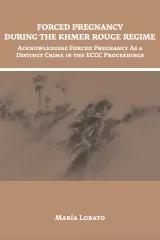Forced Pregnancy During The Khmer Rouge Regime
During the last decade, there has been growing awareness of the issue of sexual and gender-based violence during the Democratic Kampuchea (DK) regime. Research on the topic has demonstrated that a policy was implemented, which aimed to control and regulate the institution of the family through forced marriage. Evidence in Case 002 before the Extraordinary Chambers in the Courts of Cambodia (ECCC) has revealed that couples were often forced to consummate these marriages with the clear objective of producing children for the regime. Women who fell pregnant as a consequence of this policy were forced to bear children under dreadful conditions. This report proposes that these forced pregnancies produce a distinct form of harm, which should be treated as a distinct crime against humanity before the ECCC, both in the ongoing trial in Case 002/02 and in the Cases 003 and 004 under investigation.
Product details
Table of contents
I acronyms
II executive summary
III introduction
IV forced pregnancy under international criminal law
A. Definition
B. Forced pregnancy before International Criminal Courts
V forced pregnancy during the khmer rouge regime
A. Transformation of Family Life during
Democratic Kampuchea
1. Dismantling the Family
2. Forced Marriages
3. Reproduction of the Population
B. Rape within Forced Marriages
C. Forced Pregnancies
VI ACKNOWLEDGING FORCED PREGNANCY AS A DISTINCT CRIME IN THE ECCC PROCEeDINGS
A. Forced Pregnancy as an Inhumane Act
B. Elements of the Crime
1. Forcible impregnation
2. Unlawful confinement
3. Specific intent
4. Chapeau requirements
C. Forced Pregnancy before the ECCC
1. Case 002
(i) Investigative stage
(ii) Trial stage: recharacterisation and
cumulative convictions
2. Cases 003 and 004
VII conclusions
VIII Recommendations
iX Bibliography
